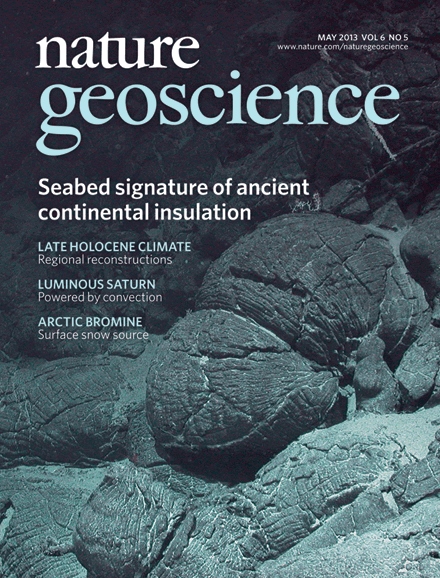The purpose of the editorial process at scientific journals is to select the papers that fit the editorial scope of the journal, and – within the limited means of the review scheme – try to make sure that published papers are technically correct and a fair representation of the scientific results presented. For most modern scientific journals, peer review has been a crucial element of this process: manuscripts are evaluated by other scientists (peers), who then send their assessment of the work to the editor. If these comments are passed on to the authors, it is anonymously. The authors won’t know who reviewed their manuscript.

The May 2013 issue of Nature Geoscience. (c) Nature Publishing Group
At Nature Geoscience, my colleagues are now trialling a double-blind peer review. In this voluntary scheme author identities are hidden from the reviewers. Author names are removed from the manuscript, and identifying passages in the manuscript (“we have previously shown in ref. x”) are avoided. The idea is to remove any bias from the reviewers towards the authors that might potentially arise from a reviewer’s knowledge of nationality, gender, or identity of the authors. Also, reviewers sometimes do not declare an improper conflict of interest to the editors, and double-blind peer review nicely takes care of this problem, too.
An argument often heard against this scheme is that just as authors try to guess the identity of a peer reviewer – in my experience usually incorrectly – so could reviewers. But as the editors of Nature Geoscience write in their editorial:
But will they indeed be anonymous? Perhaps the most popular argument against a double-blind process is that referees will guess the authors’ identities, regardless of whether or not the names are actually sent along with the paper, because the content will give them away. We realise that this may be the case occasionally, and we will rely on participating authors to phrase their paper carefully so as to avoid easy identification. Nevertheless, we are convinced that for many papers the double-blind process will serve to remove unconscious biases.
This is not the first time that double-blind peer review has been trialled, the idea is not new. A reason why this scheme hasn’t seen wider implication yet might have been the perception that the effort required to hide author identities is not worth the potential benefits. However, in recent years the wider opinion towards improving the peer review process has changed. In a 2012 survey at Nature Geoscience, three-quarters of the respondents supported double-blind peer review, which has led to the present initiative.
There are also other experiments with peer review, and I like to highlight two here:
- In 2006, Nature trialled open peer review, where any registered user could leave comments on a participating paper under review. The uptake from these reviewers was not sufficient, and this trial ended unsuccessfully. But computer technology has changed a lot since then, and modern social network tools might improve such a scheme. The last word on this issue certainly hasn’t been spoken yet.
- In 2009 the EMBO journal started transparent peer review, where the editorial decision letters, the anonymous referee reports and the authors’ responses are all published along with the paper for increased transparency. Personally, as I argued before, I believe this is an important step that brings the peer review into the open and hopefully would make it less dogmatic but instead more interactive.
Either way, this great initiative hopefully will bring an improvement to peer review. After all, peer review is a modern invention that only in the past century became widespread practice. In that sense, it is a long-running trial of science publishing of its own, and as many scientists would agree on, could benefit from improvements.
References:
1. Editorial (2013). Double-blind peer review Nature Geoscience, 6 (6), 413-413 DOI: 10.1038/ngeo1853
2. Editorial (2012). Feedback received Nature Geoscience, 5 (9), 585-585 DOI: 10.1038/ngeo1575


June 11, 2013 at 03:23
I think this is an excellent idea, particularly given the gender issues discussed in the editorial. I’m not sure comparing anonymity issues to authors guessing peer reviewers is fair though, because surely the gap left in the references will at least suggest which research group has submitted the paper, particularly in the more specialized fields.
Even if that’s true though, it’s surely an improvement on the current system, as you say. Hope the trial is a success.